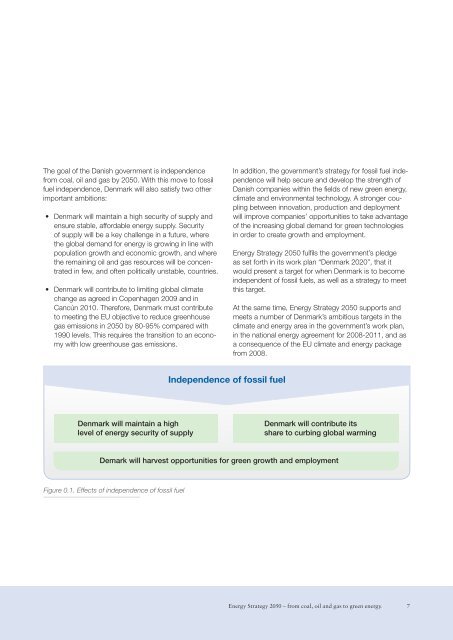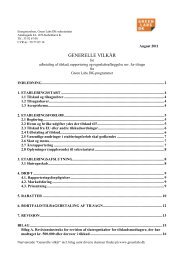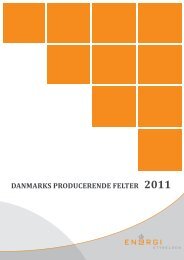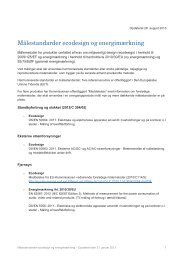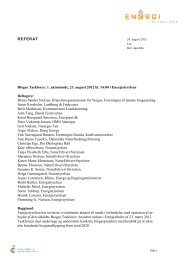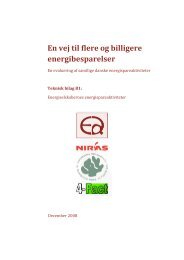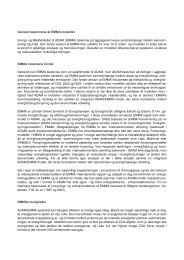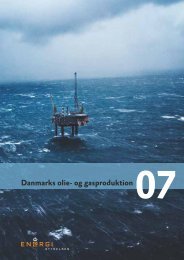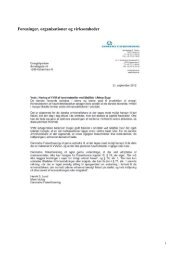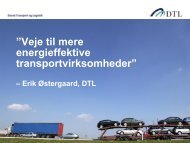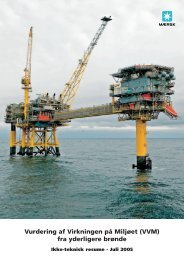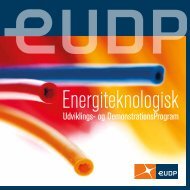Energy Strategy 2050 – from coal, oil and gas
Energy Strategy 2050 – from coal, oil and gas
Energy Strategy 2050 – from coal, oil and gas
Create successful ePaper yourself
Turn your PDF publications into a flip-book with our unique Google optimized e-Paper software.
The goal of the Danish government is independence<br />
<strong>from</strong> <strong>coal</strong>, <strong>oil</strong> <strong>and</strong> <strong>gas</strong> by <strong>2050</strong>. With this move to fossil<br />
fuel independence, Denmark will also satisfy two other<br />
important ambitions:<br />
• Denmark will maintain a high security of supply <strong>and</strong><br />
ensure stable, affordable energy supply. Security<br />
of supply will be a key challenge in a future, where<br />
the global dem<strong>and</strong> for energy is growing in line with<br />
population growth <strong>and</strong> economic growth, <strong>and</strong> where<br />
the remaining <strong>oil</strong> <strong>and</strong> <strong>gas</strong> resources will be concentrated<br />
in few, <strong>and</strong> often politically unstable, countries.<br />
• Denmark will contribute to limiting global climate<br />
change as agreed in Copenhagen 2009 <strong>and</strong> in<br />
Cancún 2010. Therefore, Denmark must contribute<br />
to meeting the EU objective to reduce greenhouse<br />
<strong>gas</strong> emissions in <strong>2050</strong> by 80-95% compared with<br />
1990 levels. This requires the transition to an economy<br />
with low greenhouse <strong>gas</strong> emissions.<br />
Denmark will maintain a high<br />
level of energy security of supply<br />
Figure 0.1. Effects of independence of fossil fuel<br />
Independence of fossil fuel<br />
In addition, the government’s strategy for fossil fuel independence<br />
will help secure <strong>and</strong> develop the strength of<br />
Danish companies within the fields of new green energy,<br />
climate <strong>and</strong> environmental technology. A stronger coupling<br />
between innovation, production <strong>and</strong> deployment<br />
will improve companies’ opportunities to take advantage<br />
of the increasing global dem<strong>and</strong> for green technologies<br />
in order to create growth <strong>and</strong> employment.<br />
<strong>Energy</strong> <strong>Strategy</strong> <strong>2050</strong> fulfils the government’s pledge<br />
as set forth in its work plan “Denmark 2020”, that it<br />
would present a target for when Denmark is to become<br />
independent of fossil fuels, as well as a strategy to meet<br />
this target.<br />
At the same time, <strong>Energy</strong> <strong>Strategy</strong> <strong>2050</strong> supports <strong>and</strong><br />
meets a number of Denmark’s ambitious targets in the<br />
climate <strong>and</strong> energy area in the government’s work plan,<br />
in the national energy agreement for 2008-2011, <strong>and</strong> as<br />
a consequence of the EU climate <strong>and</strong> energy package<br />
<strong>from</strong> 2008.<br />
Denmark will contribute its<br />
share to curbing global warming<br />
Demark will harvest opportunities for green growth <strong>and</strong> employment<br />
<strong>Energy</strong> <strong>Strategy</strong> <strong>2050</strong> <strong>–</strong> <strong>from</strong> <strong>coal</strong>, <strong>oil</strong> <strong>and</strong> <strong>gas</strong> to green energy.<br />
7


